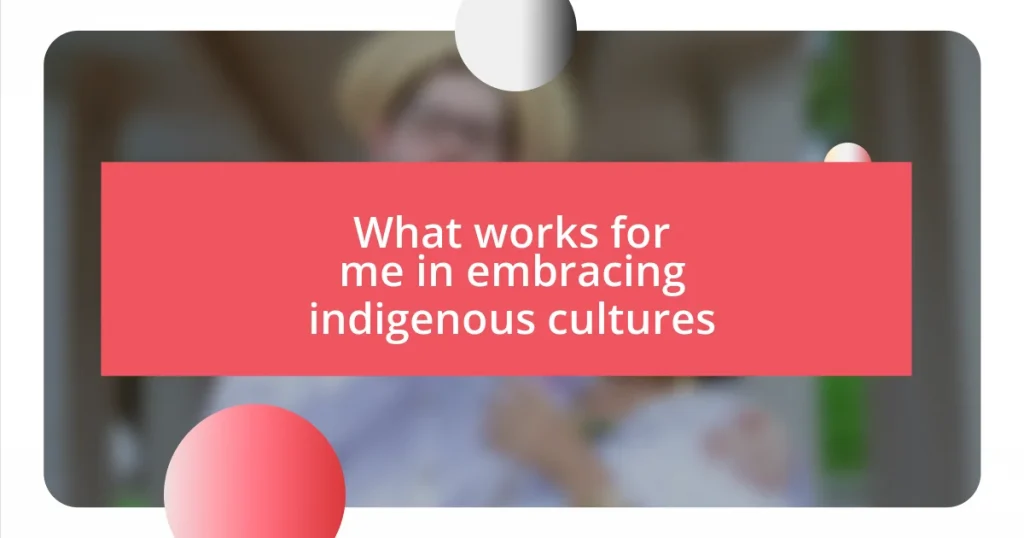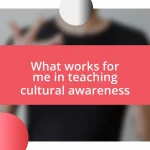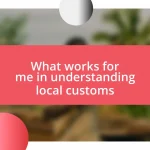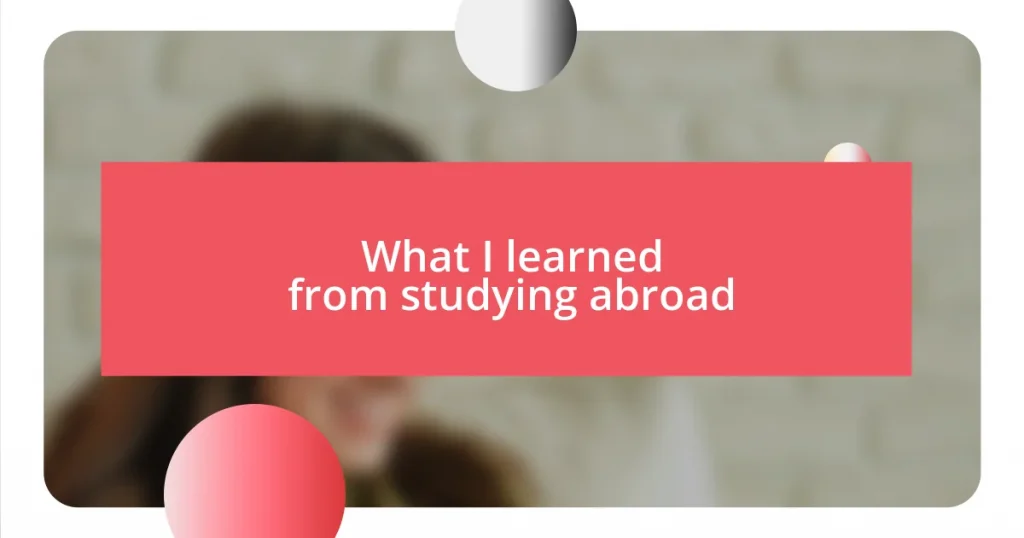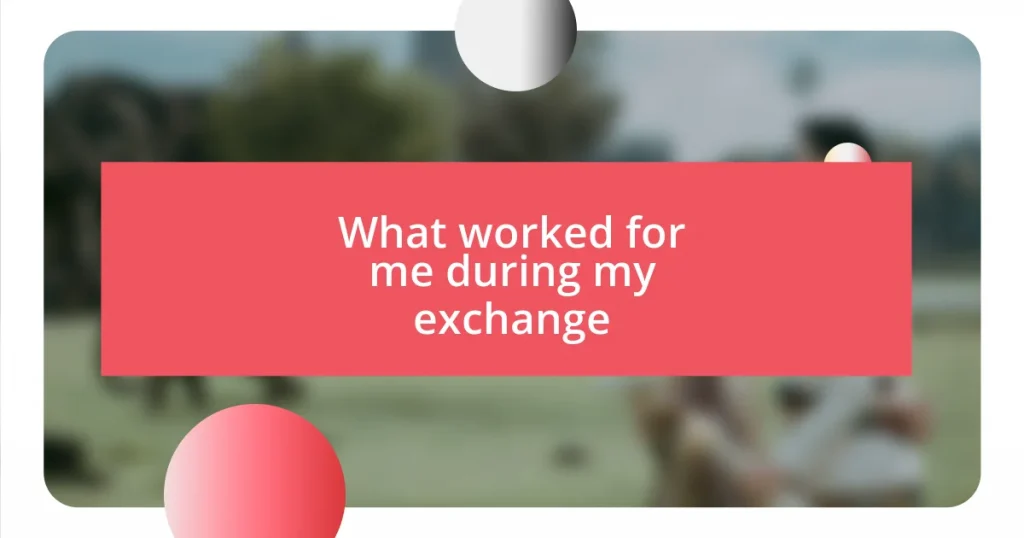Key takeaways:
- Engaging deeply with Indigenous cultures fosters emotional connections through shared experiences, storytelling, and spiritual practices.
- Cultural respect, demonstrated through active listening, participation, and advocacy, is essential for building trust and understanding with Indigenous communities.
- Support for Indigenous communities involves not only economic actions and advocacy but also promoting their voices and narratives in educational and social platforms.
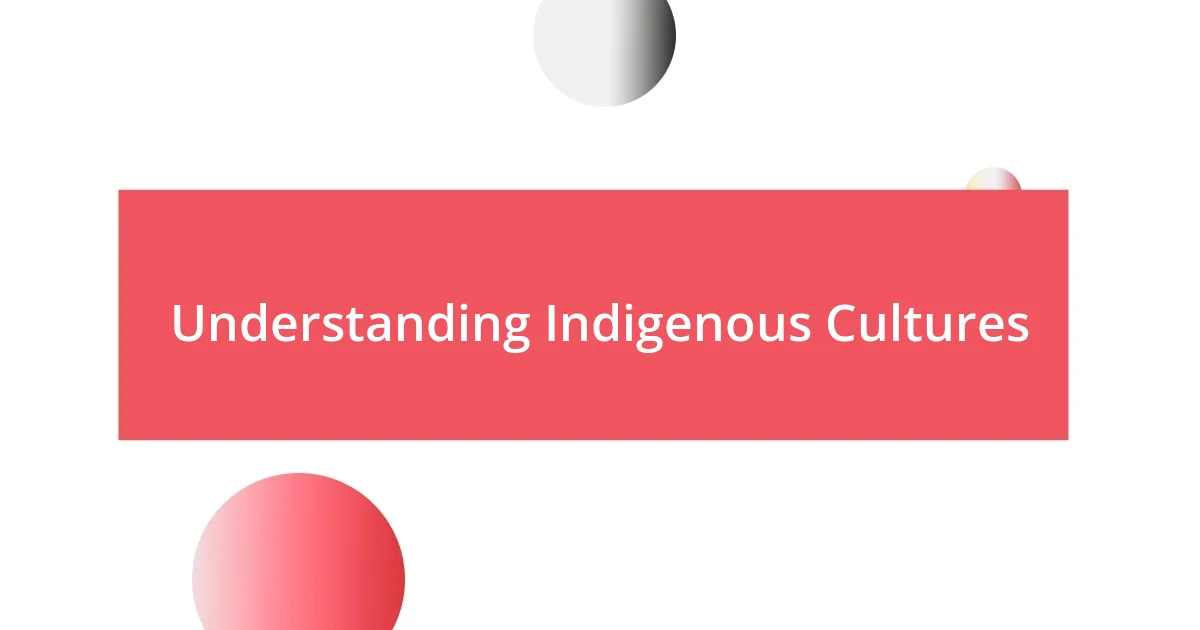
Understanding Indigenous Cultures
Understanding Indigenous cultures is about more than just knowing facts; it’s about connecting on a deeper emotional level. I remember attending an Indigenous festival where I was invited into a healing circle. The atmosphere was filled with stories and wisdom that transcended words, making me realize how intertwined their identity is with the land and community.
In my experience, one of the most striking aspects of Indigenous cultures is their rich oral traditions. When a community member shares a story, you’re not just hearing a tale; you’re absorbing lessons on respect for nature and the importance of relationships. It makes me wonder—how often do we engage with our own histories in such a meaningful way?
Recognizing the significance of spirituality in Indigenous cultures has changed my perspective on life. I felt a profound sense of peace during a smudging ceremony where the burning sage filled the air with healing energy. I often ask myself: How can we incorporate these practices into our lives to foster a deeper sense of connection to the world around us?
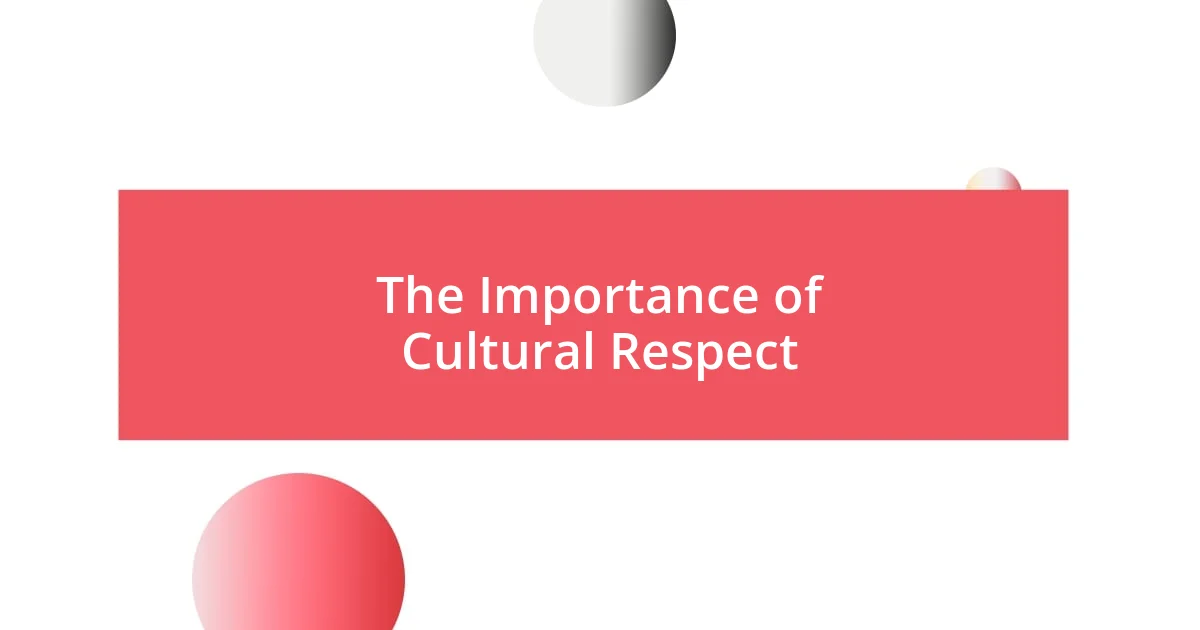
The Importance of Cultural Respect
Cultural respect is foundational in appreciating Indigenous identities. I once took part in a collaborative art project with Indigenous artists, where every stroke of paint held a story. The experience made me realize that respect is not just an obligation; it’s an invitation to understand the deeper meanings behind cultural practices and beliefs. When we approach Indigenous cultures with genuine curiosity and reverence, transformation happens—not just for us, but for the communities we engage with.
- Acknowledging cultural protocols fosters trust and strengthens relationships.
- Demonstrating interest in Indigenous languages shows respect for their heritage.
- Engaging in community-led initiatives illustrates our commitment to collaboration.
- Learning about historical contexts helps us recognize past injustices and shapes our understanding of present issues.
- Listening actively during cultural exchanges allows us to absorb wisdom and stories that might otherwise go untold.
Embracing these elements of respect has significantly enriched my perspective and brought me closer to the beauty of Indigenous cultures.

Building Genuine Connections
Building genuine connections with Indigenous cultures is rooted in an authentic willingness to engage. I recall a moment when I participated in a community gathering, and I was struck by how deeply people cared about one another. Conversations flowed effortlessly, revealing real emotions and histories that made me feel like I was part of something much bigger. I learned that when you put aside preconceived notions and simply listen, those genuine connections flourish.
Trust is a crucial element in building these connections. During a visit to an Indigenous community, I felt the warmth of their hospitality during a shared meal. Each dish carried stories from their ancestors, creating a bridge between us, enhancing our relationship. It taught me the value of sharing experiences and how, through simple acts, we can foster understanding and respect.
In my journey, I’ve discovered that vulnerability plays a significant role in connection. I once shared my own struggles with a group after hearing their stories. The emotional exchange created a safe space for dialogue, leading to mutual healing and understanding. It reinforced my belief that embracing our vulnerabilities allows us to break down barriers and form more meaningful relationships.
| Building Genuine Connections | Key Practices |
|---|---|
| Showing genuine interest | Listen actively and participate in community events. |
| Creating trust | Share meals and experiences to strengthen bonds. |
| Embracing vulnerability | Open up about personal stories to foster mutual understanding. |
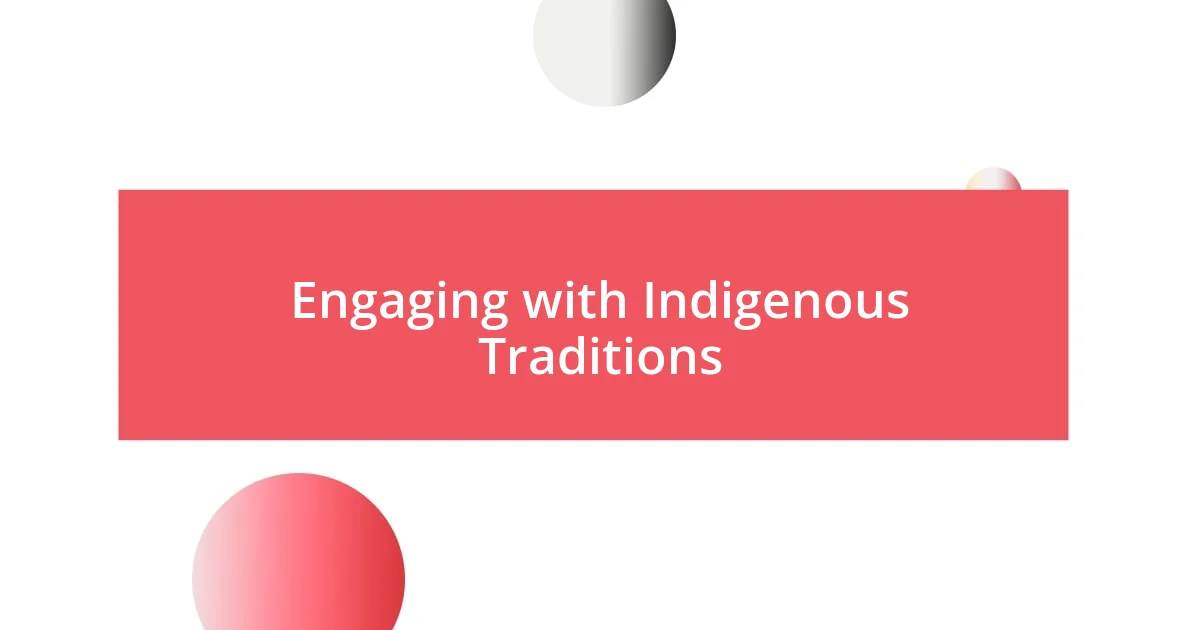
Engaging with Indigenous Traditions
Engaging with Indigenous traditions often feels like stepping into a world rich with stories and meaning. I remember attending a drum ceremony where the pulsating beat echoed not just in the air, but deep within me. Each rhythm seemed to tell a story of resilience and heritage, sparking an understanding that these traditions are alive, not relics of the past. Have you ever been in a moment where the essence of a culture wraps around you like a warm embrace? That’s what it felt like for me, and it opened my heart to the significance of cultural practices as a living expression of identity.
Participating in traditional ceremonies has taught me how these events act as gateways to deeper connections. During one such gathering, I was invited to join a storytelling circle, and as the tales unfolded, I felt a profound sense of belonging. Each story carried the weight of history, revealing insights into the values, struggles, and triumphs of the community. I realized that every shared experience strengthens not just our connection to the culture, but also to the people who keep these traditions alive.
To truly engage, I learned that it’s essential to approach with humility and openness. I once asked an elder about the significance of certain rituals, genuinely wanting to learn. Their eyes lit up, and as they explained, I felt a privilege in that moment, like I was holding a treasured family secret. It reinforced my belief that asking questions, rather than making assumptions, fosters respect and builds bridges across cultural divides. How can we expect to connect without inviting others to share their stories in their own terms?
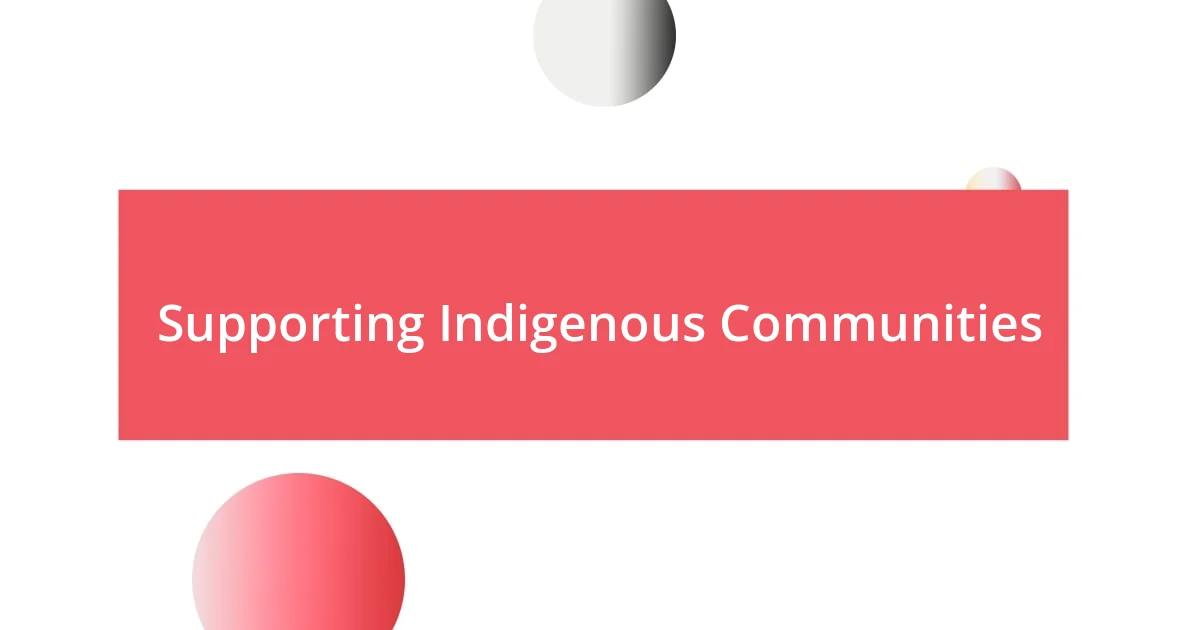
Supporting Indigenous Communities
Supporting Indigenous communities is a deeply personal commitment that transcends mere words; it’s about action. I recall a time when I volunteered at a cultural event, helping to set up and learn from those around me. Watching the pride in their eyes as they showcased their traditions illuminated the importance of actively participating in their narratives. How often do we stop to consider the power we hold in supporting Indigenous voices by simply showing up?
Focusing on economic support, I remember purchasing artwork from a local Indigenous artist, feeling the connection through each brushstroke. It wasn’t just a transaction; it felt like a lifeline, a way to uplift their talent and preserve their culture. Supporting Indigenous businesses can have a ripple effect, encouraging creativity and sustainability in their communities. Isn’t it fascinating how one choice at a market can contribute to the survival of cultural expression?
Moreover, advocacy plays a crucial role in supporting Indigenous peoples. I once joined a community forum discussing land rights, and it struck me how essential it is to amplify their voices in broader conversations. Listening and supporting their advocacy efforts made me realize that we can be allies not through assumption, but through informed actions. Are we willing to stand alongside those whose rights have been marginalized and help dismantle the systems that perpetuate injustice? This is the essence of true support.
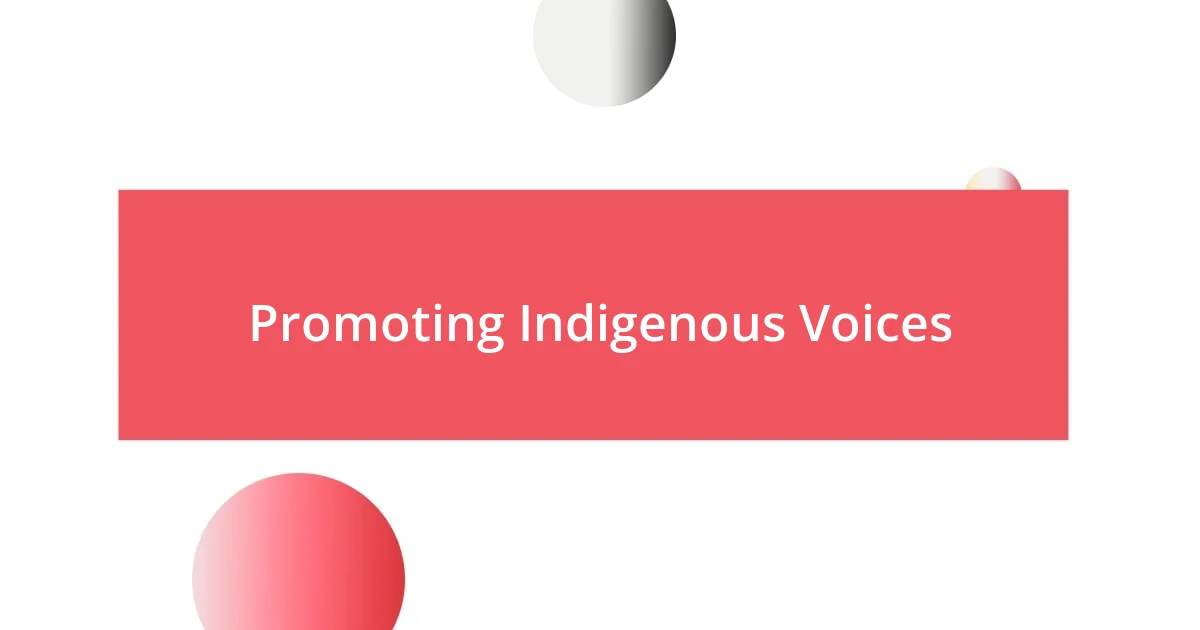
Promoting Indigenous Voices
Promoting Indigenous voices goes beyond just recognizing their presence; it’s about actively uplifting their stories and perspectives in every space we inhabit. I recall a time during a community event where an Indigenous elder shared the history of their people with such passion that it resonated with everyone in the room. Wasn’t it eye-opening to witness the impact of storytelling? Hearing directly from Indigenous communities makes their experiences more tangible and fosters a greater understanding of their realities.
I also find that creating platforms for Indigenous voices is vital. A few years ago, I attended a podcast series featuring Indigenous speakers discussing their cultures, challenges, and dreams. Listening to them share their truths inspired me to reflect on the narratives we often hear from mainstream media, which can oversimplify or misrepresent their stories. Wouldn’t it be powerful if more of us sought out those authentic voices rather than relying on interpretations from outsiders?
Moreover, I believe that education plays a crucial role in amplifying Indigenous voices. I took part in an initiative to incorporate Indigenous literature into local school curriculums. Watching students engage with these works was exhilarating; it sparked conversations and connections that encouraged empathy and respect. Isn’t it encouraging to think that by integrating their narratives into educational spaces, we are helping shape a future where Indigenous voices are not just heard, but celebrated?
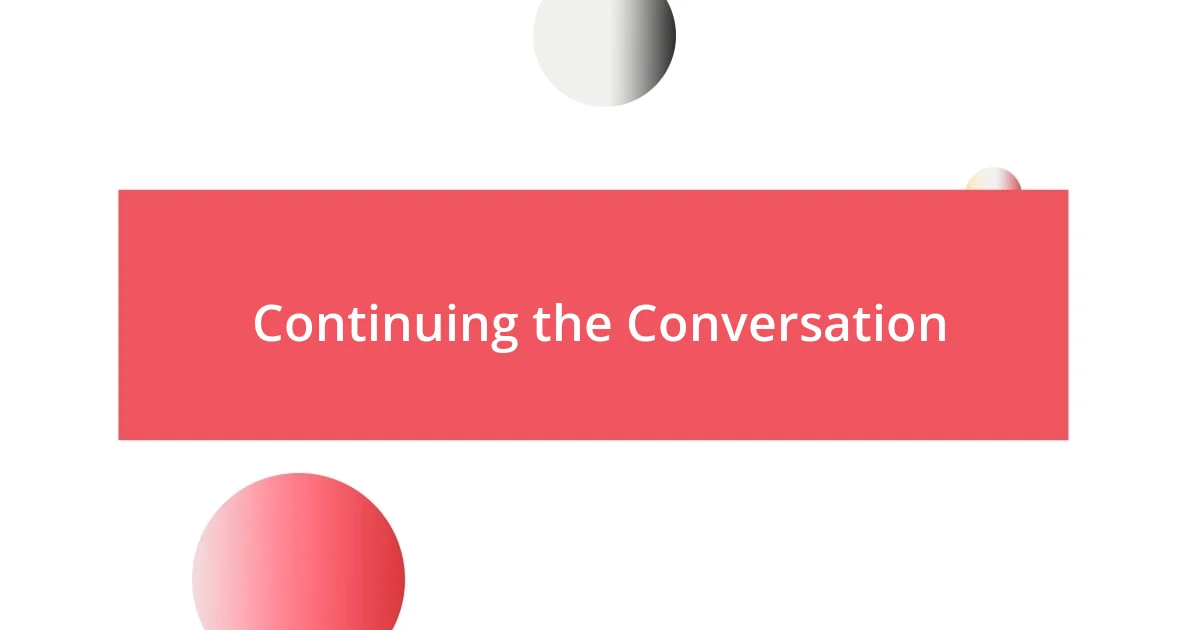
Continuing the Conversation
Continuing the conversation about embracing Indigenous cultures requires a genuine commitment to ongoing engagement. I vividly remember joining a book club focused on Indigenous authors, where I was surprised by the depth of insight each story provided. Hasn’t it been fascinating to see how literature can open up avenues for dialogue? Every discussion felt like peeling back layers of understanding, and that’s precisely what we need to maintain meaningful connections.
In my experience, attending community meetings that address Indigenous issues has been transformative. The exchange of ideas often ignites a fire within me, pushing me to reconsider my own beliefs and the impacts of my actions. Have you ever left a meeting feeling a renewed sense of purpose? Those moments are catalysts for change, inviting us to act not just as allies, but as participants in the ongoing narrative.
Moreover, social media has emerged as a vital tool for continuing the conversation. I often follow Indigenous voices who share their experiences and perspectives, which challenges me to reflect on my own. When I engage with their content, whether by sharing insights or simply amplifying their messages, I feel a part of something larger. Isn’t it incredible how a few clicks can foster community and propel awareness? Embracing Indigenous cultures is a lifelong commitment, and making space for these conversations sustains that journey.










